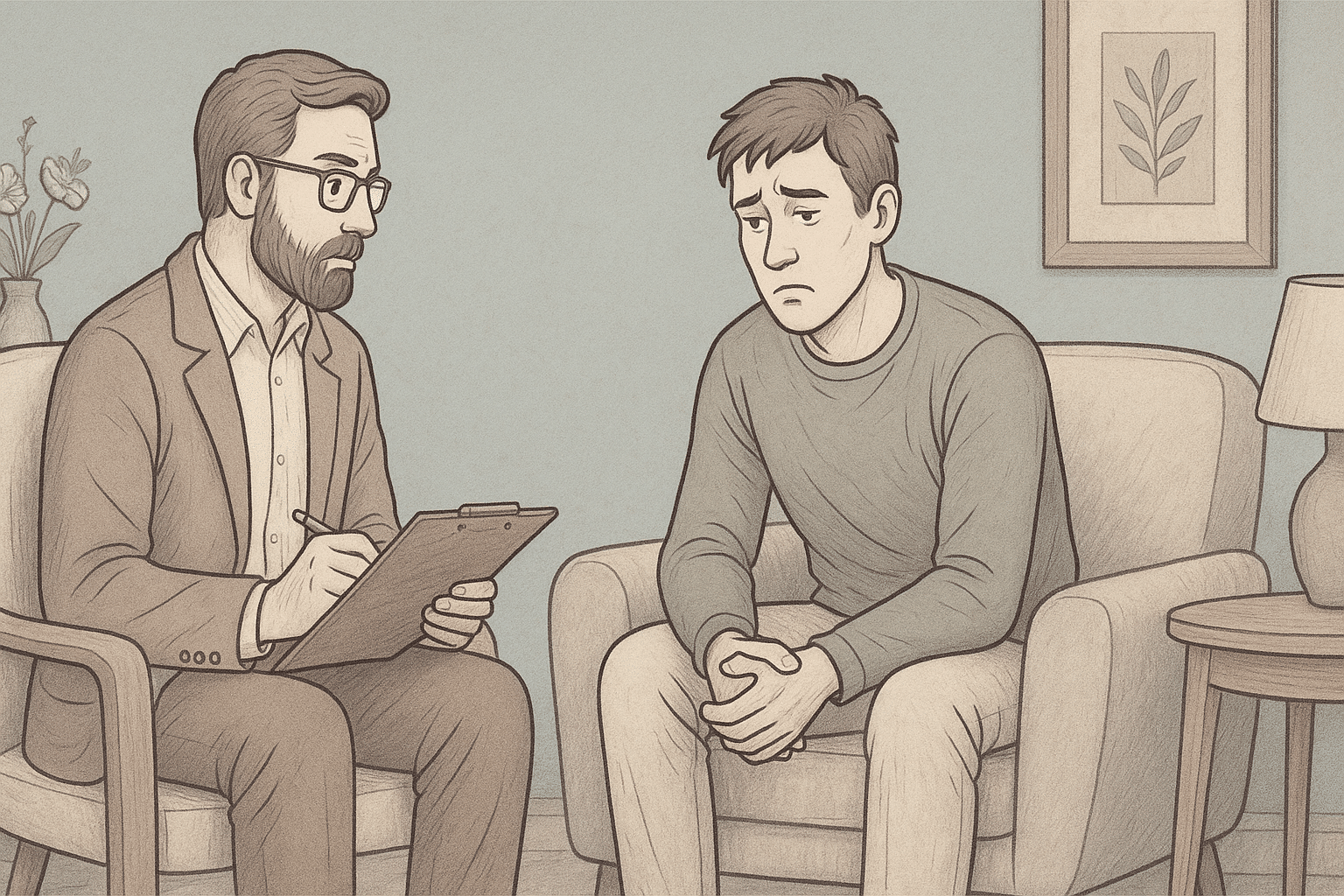
Key Takeaways
- Chronic anger differs from typical anger responses, persisting for extended periods and potentially causing significant health complications like heart disease and weakened immunity.
- Identifying personal triggers through methods like journaling and mindfulness is the crucial first step in managing chronic anger effectively.
- Immediate calming techniques such as deep breathing and grounding exercises provide valuable tools for managing anger in the moment before it escalates.
- Long-term management of chronic anger requires a multi-faceted approach including lifestyle changes, communication skill development, and possibly professional treatment.
- At Mission Connection, we offer specialized therapy approaches including CBT, DBT, trauma-focused treatments, and medication considerations when appropriate that can help restructure negative thought patterns driving chronic anger.
What Is Chronic Anger?
Chronic anger is more than just occasional frustration or temporary irritation. It’s a persistent emotional state characterized by frequent, intense feelings of anger that significantly impact quality of life. Unlike momentary anger that fades quickly, chronic anger becomes a lingering emotional backdrop, affecting everything from physical health to interpersonal relationships.
Physical Health Impact
The body wasn’t designed to sustain prolonged anger states, and the health consequences can be severe. Chronic anger triggers persistent stress responses that flood the body with cortisol, adrenaline, and noradrenaline, raising blood pressure, increasing heart rate, and tensing muscles.
Over time, this physiological storm can lead to serious health complications including heart disease, weakened immunity, digestive issues, and chronic pain conditions.
Relationship Damage
Perhaps the most immediate and visible impact of chronic anger occurs in relationships. Persistent anger creates emotional distance, erodes trust, and damages communication patterns with loved ones, colleagues, and even casual acquaintances.
This leads to isolation from important relationships or jeopardized career opportunities.
Mission Connection offers flexible outpatient care for adults needing more than weekly therapy. Our in-person and telehealth programs include individual, group, and experiential therapy, along with psychiatric care and medication management.
We treat anxiety, depression, trauma, and bipolar disorder using evidence-based approaches like CBT, DBT, mindfulness, and trauma-focused therapies. Designed to fit into daily life, our services provide consistent support without requiring residential care.
Root Causes

Childhood Experiences
Growing up in environments where anger was the predominant emotional expression or where needs went consistently unmet can establish anger as a default response pattern.
Similarly, children who weren’t allowed to express anger in healthy ways often struggle with appropriate anger expression as adults.
Trauma Response
Trauma creates profound changes in how the brain processes perceived threats. For many trauma survivors, anger serves as a protective mechanism, keeping potential threats at bay and creating a sense of control in an unpredictable world.
What others might perceive as “anger issues” may actually represent trauma responses designed to protect against further harm.
Genetic Factors
Emerging research suggests that genetic predisposition may play a role in how easily and intensely we experience anger. Some individuals appear biologically wired for greater emotional reactivity, with variations in neurotransmitter regulation and nervous system sensitivity.
These biological factors need to be considered when developing comprehensive treatment plans, recognizing that effective management may require addressing both psychological patterns and physiological tendencies.
Underlying Mental Health Issues
Chronic anger frequently accompanies other mental health conditions, sometimes serving as a symptom rather than the core issue. Depression, anxiety disorders, PTSD, ADHD, and bipolar disorder can all manifest with increased irritability and anger.
Understanding the relationship between chronic anger and other mental health conditions allows for more effective, targeted interventions.
Warning Signs
Physical Symptoms

Common physical manifestations of chronic anger include:
- Persistent muscle tension, especially in the jaw, neck, and shoulders
- Headaches that seem to have no other cause
- Digestive disturbances including acid reflux and stomach pain
- Elevated blood pressure
- Disrupted sleep patterns
Emotional Red Flags
Emotionally, chronic anger often presents as a persistently short fuse, where minor irritations trigger disproportionate responses. Individuals may experience a pervasive sense of resentment, feeling that the world is against them or that others consistently let them down.
Another common emotional pattern involves cycling between explosive anger and intense guilt or shame about these outbursts. This cycle can become self-perpetuating, as shame about anger expressions may actually increase underlying tension and trigger subsequent episodes.
Behavioral Patterns
Behaviorally, chronic anger often manifests through verbal aggression, including yelling, harsh criticism, or passive-aggressive communication.
Some individuals engage in physical expressions like slamming doors, throwing objects, or aggressive driving. Social withdrawal frequently occurs as relationships become strained and individuals attempt to avoid triggering situations.
Identify Your Triggers
Understanding what activates chronic anger in the first place is the foundation of any successful anger management strategy, allowing for both preventative measures and targeted interventions.
Common External Triggers
External triggers might include:
- Specific relationship dynamics, such as feeling disrespected or unheard
- Environmental factors like noise, crowding, or disorder
- Work-related stressors including deadlines, criticism, or perceived unfairness
- Practical frustrations like traffic delays or technology malfunctions
Conduct a detailed analysis of your anger episodes to identify these external patterns, which create opportunities for proactive management strategies.
Internal Thought Patterns
Cognitive triggers include patterns like catastrophizing (“This always happens to me”), mind-reading (“They’re deliberately trying to upset me”), rigid expectations (“Things should work properly”), and personalization (“This is happening because of me”).
These thought patterns transform momentary frustrations into sustained anger states, often operating below conscious awareness until brought into focus through therapeutic work.
Keeping An Anger Journal

This structured practice involves recording anger episodes, noting their intensity, duration, triggers, thoughts, and the resulting behaviors. Over time, patterns emerge that might not be obvious at the moment.
We recommend you track these episodes daily, including even minor irritations, as these often reveal important patterns that provide insights for intervention.
Immediate Calming Techniques
1. Deep Breathing
Deep, controlled breathing represents one of the most accessible and effective anger management techniques available. By activating the parasympathetic nervous system, deep breathing counteracts the fight-or-flight response that fuels anger.
The effectiveness of breathing techniques comes from their physiological impact rather than just distraction. When practiced regularly, these techniques literally change how the body processes stress hormones and create new neural pathways for responding to triggering situations.
Therapy Approaches

Several evidence-based therapy approaches to address chronic anger. Cognitive Behavioral Therapy (CBT) stands at the forefront, helping individuals identify and restructure negative thought patterns that fuel anger responses.
Through CBT, you learn to challenge catastrophic thinking and develop more balanced perspectives. Dialectical Behavior Therapy (DBT) also provides essential skills for emotion regulation and distress tolerance, particularly beneficial for those who experience intense emotional reactions.
Medication Considerations
While there’s no specific “anger medication,” certain pharmacological interventions can help manage symptoms that contribute to chronic anger. For individuals with underlying anxiety, depression, or mood disorders, appropriate medication can reduce emotional volatility and create space for therapeutic work.
Selective serotonin reuptake inhibitors (SSRIs) sometimes help reduce irritability and emotional reactivity, while mood stabilizers may benefit those with more severe emotional dysregulation. Always carefully weigh benefits against potential side effects through ongoing consultation with your psychiatrist.
Support Groups
Many people find tremendous value in anger management support groups, where shared experiences normalize struggles and provide real-world strategies.
These groups offer accountability, perspective, and the unique understanding that comes from others facing similar challenges. The collective wisdom of the group often generates practical solutions that might not emerge in individual therapy sessions.
Support groups also combat the isolation that frequently accompanies chronic anger, as relationships strain under its weight. Simply knowing you’re not alone in your struggle significantly reduces shame and increases motivation for change.
Transform Your Relationship with Anger Through Expert Care at Mission Connection

At Mission Connection, our experienced team understands that chronic anger often signals deeper underlying issues requiring careful assessment and targeted intervention. If your anger stems from childhood trauma, unresolved mental health conditions, or learned response patterns, we provide the specialized care needed to address root causes rather than just surface symptoms.
Our evidence-based treatment combines CBT, DBT, trauma-focused approaches, and when appropriate, medication support to create lasting change. Through our outpatient services and telehealth programs, you can access expert care while maintaining work, family, and personal responsibilities. We also offer anger management support groups where shared experiences normalize struggles and provide practical strategies from others facing similar challenges.
Don’t let anger continue damaging your health, relationships, and quality of life. Contact Mission Connection today to begin your transformation toward healthier emotional expression and restored relationships.
Call Today 866-833-1822.
Frequently Asked Questions (FAQ)
Can chronic anger cause physical health problems?
Chronic anger significantly impacts physical health through multiple biological pathways. The stress hormones released during frequent anger episodes particularly cortisol, adrenaline, and noradrenaline, take a cumulative toll on bodily systems when chronically elevated.
These hormones increase inflammation, raise blood pressure, accelerate heart rate, and suppress immune function. Over time, these physiological changes increase risk for serious health complications and may exacerbate existing conditions.
How long does anger management therapy take to work?
The timeline for seeing results from anger management therapy varies considerably based on factors like the severity and duration of anger issues, underlying causes, consistent application of techniques, and individual temperament.
Many individuals notice some improvement within the first few weeks simply from increased awareness and basic technique implementation.
Can meditation help with chronic anger?
Research consistently demonstrates meditation’s effectiveness for managing chronic anger when practiced regularly. Meditation creates measurable changes in brain regions associated with emotional regulation, particularly the amygdala (which processes threat responses) and the prefrontal cortex (responsible for judgment and impulse control).
Regular practice strengthens the neural connections that allow for pause between trigger and response, creating the crucial space needed for choosing different reactions.
Should I avoid my anger triggers completely?
While temporary avoidance of triggers can provide immediate relief during early stages of anger management, complete avoidance is not a sustainable long-term strategy.
We generally recommend a balanced approach that combines strategic avoidance of unnecessary triggers with gradual exposure to unavoidable ones. This approach allows you to build skills in controlled circumstances before facing more challenging situations.
How does Mission Connection’s approach to chronic anger treatment differ from other providers?
Mission Connection offers comprehensive, individualized treatment that addresses both symptoms and underlying causes of chronic anger.
Our multi-modal approach combines evidence-based therapies including CBT and DBT, trauma-focused treatments when needed, medication considerations through psychiatric consultation, and specialized anger management groups.
We conduct thorough assessments to identify root causes and develop personalized treatment plans.


